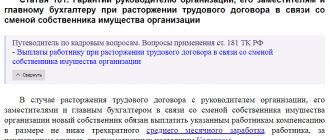Full text of Art. 84.1 of the Labor Code of the Russian Federation with comments. New current edition with additions for 2021. Legal advice on Article 84.1 of the Labor Code of the Russian Federation.
Termination of an employment contract is formalized by order (instruction) of the employer.
The employee must be familiarized with the order (instruction) of the employer to terminate the employment contract against signature. At the request of the employee, the employer is obliged to provide him with a duly certified copy of the specified order (instruction). In the event that an order (instruction) to terminate an employment contract cannot be brought to the attention of the employee or the employee refuses to familiarize himself with it against signature, a corresponding entry is made on the order (instruction).
The day of termination of the employment contract in all cases is the last day of work of the employee, with the exception of cases where the employee did not actually work, but in accordance with this Code or other federal law, he retained his place of work (position).
On the day of termination of the employment contract, the employer is obliged to issue the employee a work book and make payments to him in accordance with Article 140 of this Code. Upon written application by the employee, the employer is also obliged to provide him with duly certified copies of documents related to work.
An entry in the work book about the basis and reason for termination of the employment contract must be made in strict accordance with the wording of this Code or other federal law and with reference to the relevant article, part of the article, paragraph of the article of this Code or other federal law.
If on the day of termination of the employment contract it is impossible to issue a work book to an employee due to his absence or refusal to receive it, the employer is obliged to send the employee a notice of the need to appear for the work book or agree to send it by mail. From the date of sending this notification, the employer is released from liability for the delay in issuing the work book. The employer is also not responsible for the delay in issuing a work book in cases where the last day of work does not coincide with the day of registration of termination of employment relations upon dismissal of an employee on the basis provided for in subparagraph “a” of paragraph 6 of part one of Article 81 or paragraph 4 of part one of Article 83 of this Code, and upon dismissal of a woman whose employment contract was extended until the end of pregnancy or until the end of maternity leave in accordance with part two of Article 261 of this Code. Upon written request from an employee who has not received a work book after dismissal, the employer is obliged to issue it no later than three working days from the date of the employee’s application.
Commentary on Article 84.1 of the Labor Code of the Russian Federation
1. The commented article establishes the procedure for formalizing the termination of an employment contract, which must be observed by employers in all cases of dismissal of an employee.
Among other things, it is indicated that the employer must issue an order to terminate the employment contract (as a rule, the unified form N T-8 or T-8a is used, approved by Resolution of the State Statistics Committee of Russia dated January 5, 2004 N 1, but from January 1, 2013 year, it is not mandatory for use). The employee must be familiarized with such an order against personal signature; upon the employee’s request, he is given a copy of this order.
It is advisable to do this on the day of the employee’s dismissal (although in relation to dismissals that constitute disciplinary sanctions, Article 193 of the Labor Code of the Russian Federation establishes that the corresponding order is announced to the employee against signature within three working days from the date of its publication, not counting the time the employee is absent from work) .
If the employee does not want to familiarize himself with the order (which is typical for cases of termination of the employment contract at the initiative of the employer), then a note about this is made on the order, as well as if for some reason it is impossible to present this order to the employee for review. (for example, there is prolonged absenteeism and the employee does not show up for work).
The day of termination of the employment contract is the last day of work of the employee.
An exception is the case when the employee did not actually work, but in accordance with the Labor Code of the Russian Federation or other federal law, his place of work (position) was retained.
The employer is also obliged to make a settlement with the employee. In this case, one should be guided by Art. 140 of the Labor Code of the Russian Federation, namely: all amounts due to the employee from the employer must be paid on the day of his dismissal, regardless of the grounds for termination of the employment contract. If the employee did not work on the day of dismissal, then the corresponding amounts must be paid no later than the next day after the dismissed employee submits a request for payment.
It must be borne in mind that the settlement period upon termination of an employment contract cannot be changed by agreement between the employee and the employer.
In the event of a dispute about the amount of amounts due to an employee upon dismissal, the employer is obliged on the day of dismissal or no later than the next day after the dismissed employee submits a request for payment to pay the amount not disputed by him.
It is possible that an employee refuses to receive a payment. As an illustration, we give an example from judicial practice. The funds were sent by the employer to the employee by postal order. The court considered that in this case it was not excluded for the employee to receive a postal transfer with the calculation of the amounts due in the postal service organization; this calculation corresponds to the conditions of remuneration established by Chapter 5 of the Labor Code of the Russian Federation (see the appeal ruling of the Khabarovsk Regional Court dated September 26, 2012 on case No. 33-5976/2012).
It must be borne in mind that when an employee is granted leave with subsequent dismissal, all calculations are made before going on leave, since after its expiration the parties will no longer be bound by obligations (letter of Rostrud dated December 24, 2007 N 5277-6-1).
2. Also, upon a written application from the employee, the employer is obliged to provide him with duly certified copies of documents related to work.
It must be borne in mind that according to paragraph 3, paragraph 2 of Art. 4.1 of the Federal Law “On compulsory social insurance in case of temporary disability and in connection with maternity”, the employee, as an insured person, must be issued a certificate of the amount of earnings for the two calendar years preceding the year of termination of work (service, other activities).
In addition, according to Art. 11 Federal Law “On individual (personalized) accounting in the compulsory pension insurance system” on the day of dismissal of the insured person or on the day of termination of a civil law contract for which insurance premiums are calculated in accordance with the legislation of the Russian Federation, the policyholder is obliged to transfer information to the insured person , provided for in paragraph 1, paragraph 4 of Art. 11 of the specified federal law, and obtain written confirmation from the insured person of the transfer of this information to him. This information is provided in forms approved by Resolution of the Board of the Pension Fund of the Russian Federation dated January 16, 2014 N 2p “On approval of the form of calculation for accrued and paid insurance contributions for compulsory pension insurance to the Pension Fund of the Russian Federation and for compulsory medical insurance to the Federal Compulsory Medical Insurance Fund by payers insurance premiums that make payments and other remuneration to individuals, and the Procedure for filling it out.”
In the event of the dismissal of an employee subject to military registration, the employer is obliged to notify the military registration and enlistment office and (or) local government bodies within two weeks, providing information about the dismissed person in the form in accordance with Appendix No. 9 to the Methodological Recommendations for maintaining military registration in organizations, approved by the General Staff RF Armed Forces.
If deductions were made from the salary of the dismissed employee according to the writ of execution, then the employer is obliged to immediately notify the Bailiff Service about the dismissal of the employee and return the writ of execution (Part 4 of Article 98 of the Federal Law “On Enforcement Proceedings”).
3. An entry in the work book about the basis and reason for termination of the employment contract must be made in strict accordance with the wording of the Labor Code of the Russian Federation (as well as any other federal law, if it provides for the basis for dismissal), without abbreviation or change and with reference to the relevant article, part articles, paragraph of an article of the Labor Code of the Russian Federation (other federal law). In this case, it is necessary to take into account all the instructions contained in section 5 of the Instructions for filling out work books, approved by Resolution of the Ministry of Labor of the Russian Federation of October 10, 2003 N 69.
On the day of termination of the employment contract, the employer is obliged to issue the employee a work book. Upon receipt of it, the employee puts a personal signature on the personal card and in the book for recording the movement of work books and inserts in them (clause 41 of the Decree of the Government of the Russian Federation of April 16, 2003 N 225 “On work books”).
It must be remembered that by delaying the issuance of a work book to an employee, the employer thereby illegally deprives the employee of the opportunity to work, since, without having a work book in hand, the employee is deprived of the opportunity to go to work for another employer. Consequently, the employer is obliged to compensate the employee for the wages he did not receive during the entire delay (Article 234 of the Labor Code of the Russian Federation).
At the same time, the commented article provides for the case when an employee refuses to pick up a work book or is absent from work for some reason (it seems that a corresponding act should be drawn up about this).
If it is discovered that it is impossible to issue a work book to an employee, the employer should immediately send him a notice of the need to appear for the work book or agree to send it by mail. It is necessary to use the information available to the employer about the employee’s registration at the place of residence. If the employee’s actual residence address is different, it is advisable to duplicate such a letter to another address. Of course, the notification letter to the employee should be sent by registered mail with return receipt requested, so that there is evidence that this requirement has been met.
From the day the notice is sent, the employer is released from any liability for the delay in issuing the work book, even if the employee does not appear to receive the letter.
At the same time, the commented article establishes that upon a written request from an employee who has not received a work book after dismissal, the employer is obliged to issue it no later than three working days from the date of the employee’s application. The work book can be issued either to the employee or sent to him by mail in a valuable letter with a list of the contents and a receipt, if the employee has agreed to this.
The employer is also not responsible for the delay in issuing a work book in cases where the last day of work does not coincide with the day of registration of termination of the employment relationship when an employee is dismissed due to absenteeism (clause “a”, paragraph 6, part 1, article 81 of the Labor Code of the Russian Federation), or the employee’s conviction to a punishment that excludes the continuation of the previous job, in accordance with a court verdict that has entered into legal force (clause 4, part 1, article 83 of the Labor Code of the Russian Federation), as well as upon the dismissal of a woman whose employment contract was extended until the end of pregnancy, according to Part 2 of Art. 261 Labor Code of the Russian Federation.
Question
The employer carried out an illegal dismissal and for six months does not pay the former employee’s salary or issue a work book. How to proceed?
Lawyer's response:
According to Art. 140 of the Labor Code of the Russian Federation, upon termination of employment contracts, all amounts due are paid on the day of dismissal. In accordance with Art. 84-1 of the Labor Code of the Russian Federation, the issuance of a work book, as well as copies of documentation related to work, is carried out on the day of termination of the employment relationship. If the employer violates these legal norms, the employee is recommended to contact the State Tax Inspectorate (Article 356 of the Labor Code of the Russian Federation) or the court (Article 392 of the Labor Code of the Russian Federation).
Another comment to Art. 84.1 Labor Code of the Russian Federation
1. The unified form of an order (instruction) on the termination (termination) of an employment contract is established by Resolution of the State Committee of the Russian Federation on Statistics dated January 5, 2004 No. 1.
2. The work book is issued to the employee only upon dismissal of the latter. Along with the work book, upon the written application of the employee, he must be given copies of documents related to the work.
If on the day of the employee’s dismissal (termination of the employment contract) it is impossible to issue a work book due to the employee’s absence or his refusal to receive the work book in hand, the employer sends the employee a notice of the need to appear for the work book or agree to send it by mail. Sending a work book by mail to the address specified by the employee is permitted only with his consent.
From the date of sending this notification, the employer is released from liability for the delay in issuing a work book to the employee.
3. On the employer’s financial liability for the delay in issuing a work book to an employee, see Art. 234 Labor Code and commentary thereto.
4. Entries in the work book about the reasons for termination of the employment contract are made in strict accordance with the wording of the Labor Code or other federal law and with reference to the relevant article, paragraph of the Labor Code or other federal law. The Labor Code did not provide rules that should be followed when formulating the basis for termination of an employment contract when making entries in the work book, which caused certain problems in practice. Currently, such rules have been established. Despite all the illogicality of the solution to this problem and the obvious contradiction of such a solution to the generally accepted fundamentals of legal technology. Rules for maintaining and storing work books, producing work book forms and providing them to employers, approved. Decree of the Government of the Russian Federation of April 16, 2003 N 225, have one obvious advantage - they make it possible to unify on a nationwide scale the practice of formulating the grounds for termination of an employment contract in work books.
Federal legislation establishes several options for formulating the grounds for termination of an employment contract:
a) the grounds provided exclusively for part 1 of Art. 77 TK. There are few such grounds in modern legislation - these are clauses 5 - 9 of Art. 77. When terminating an employment contract on the specified grounds, reference should be made to these grounds (clause 15 of the Rules);
b) the grounds specified in Part 1 of Art. 77 and in a special article of the Labor Code, and the latter is not divided into paragraphs (for example, paragraph 3 of Article 77 and Article 80; paragraph 11 of Article 77 and Article 84 of the Labor Code). In these cases, an entry about the termination of the employment contract is made in the work book with reference to the corresponding paragraph of Part 1 of Art. 77 Labor Code (clause 15 of the Rules);
c) the grounds specified in Part 1 of Art. 77 and in a special article of the Labor Code, and the latter, in turn, is divided into paragraphs (clause 4 of article 77 and article 81, clause 10 of article 77 and article 83 of the Labor Code). In such a situation, one should refer to the corresponding paragraph of the special article of the Labor Code (clauses 16 and 17 of the Rules);
d) grounds that are not contained in Part 1 of Art. 77 of the Labor Code, but are provided for by special norms of the Labor Code. In this case, an entry about the termination of the employment contract is made in the work book with reference to the relevant paragraph, article of the Labor Code (clause 18 of the Rules);
e) the grounds established by the employment contract, in cases where such a possibility is provided for by the Labor Code.
The rules for maintaining labor records do not specify the procedure for formulating the grounds for termination of an employment contract in such cases. It should be assumed that when terminating an employment contract on the specified grounds, it is necessary to indicate the article of the Labor Code that provides for this type of basis (see Articles 312, 347 of the Labor Code and the commentary thereto). The current Labor Code provides for a rather dubious exception to this rule: termination of an employment contract with the head of the organization, members of the collegial executive body of the organization on the basis established in the employment contract with the relevant employee is considered solely as termination of the employment contract at the initiative of the employer (see paragraph 13 of Art. 81 Labor Code and commentary thereto). Therefore, in this case, termination of the employment contract should be formalized with reference to the specified paragraph.
Formulating a list of grounds for termination of an employment contract is the responsibility of the parties. Such grounds may either be related to the guilty actions of the employer or employee, or may not imply the presence of such actions. Circumstances not at all related to the employee’s work activities may also be provided as grounds for termination of an employment contract. At the same time, the freedom of the parties to determine the grounds for its termination cannot be unlimited.
Firstly, the employment contract cannot change or clarify the grounds for termination of the employment contract, formulated in the mandatory norms of labor legislation; in any case, they cannot be changed in the direction of worsening the employee’s situation in comparison with that established by law.
Secondly, grounds for dismissal that are related to circumstances of a general civil nature that discriminate against one party or another are recognized as invalid. For example, it is impossible to link the preservation of an employment relationship with membership in a certain party, public organization (or refusal of such membership), or restriction of voting rights. Since, as follows from civil legislation (clause 3 of Article 22 of the Civil Code), a complete or partial refusal of a citizen from legal capacity or legal capacity and other transactions aimed at limiting legal capacity or legal capacity are void, will not have legal force and the conditions for maintaining the employment relationship, implying such restrictions on civil legal capacity and legal capacity;
f) grounds not provided for by the Labor Code and established by other federal laws (primarily laws regulating relations arising in the field of state and municipal service). In such cases, the Rules require that an entry on the termination of the employment contract be made in the work book with reference to the article (clause) of the relevant federal law.
5. When terminating an employment contract at the initiative of an employee for a valid reason, a record of dismissal is made in the work book indicating this reason.
6. An entry about dismissal in an employee’s work book is made in compliance with the following rules: in column 1 the serial number of the entry is entered; in column 2 - date of dismissal; in column 3 - the reason for dismissal; in column 4 - order (instruction), its date and number.
When an employee is dismissed (termination of an employment contract), all entries made in the work book during work in this organization are certified by the signature of the employer or the person responsible for maintaining work books, the seal of the organization (personnel service) and the signature of the employee himself.
If the work book was filled out in the state language of the Russian Federation and in the state language of the republic within the Russian Federation, both texts are certified.
If there is a delay in issuing a work book due to the fault of the employer, the employee is paid the average salary for the entire period of forced absence (see Article 234 of the Labor Code and the commentary thereto). In this case, the day of dismissal is considered to be the day the work book is issued. An order is issued about the new day of dismissal and an entry is made in the work book. A previously made entry about the day of dismissal is considered invalid.
In the event of the death of an employee, the work book, after making an appropriate entry on the termination of the employment contract, is handed over to one of his relatives against signature or sent by mail upon the written application of one of the relatives.
Upon dismissal (termination of an employment contract) in connection with the transfer of an employee to another permanent job with another employer (to another organization), in column 3 of the “Information about work” section of the work book, it is indicated in what order the transfer is carried out: at the request of the employee or with his consent .
When hired to a new place of work, an entry is made in the employee’s work book in column 3 of the “Information about work” section in the order indicated above, indicating that the employee was accepted (appointed) in the order of transfer.
Upon dismissal (termination of an employment contract) in connection with the transfer of an employee to an elective job (position) to another employer (to another organization), an entry is made in the work book: “Dismissed in connection with the transfer to an elective job (position) in (indicate the name of the organization) , clause 5, part 1, art. 77 Labor Code of the Russian Federation."
At a new place of work, after indicating the full name of the elected body, as well as the abbreviated name of the elected body (if any), in column 3 of the “Work Information” section of the work book, an entry is made about what job (position) the employee was elected to, and in the column 4 indicates the decision of the elected body, the date and number of its adoption.
7. In accordance with Part 3 of the commented article, “the day of termination of the employment contract in all cases is the last day of work of the employee, with the exception of cases where the employee did not actually work, but in accordance with this Code or other federal law, his place of work was retained ( job title)". Such cases include, for example, filing a written resignation letter before going on vacation, so that the employment contract with him will be terminated at the end of the vacation (see commentary to Article 80 of the Labor Code).
In accordance with the Labor Code, upon a written application from an employee, he may be granted unused vacation with subsequent dismissal (except for cases of dismissal for guilty actions); upon dismissal due to the expiration of the employment contract, the employee may be granted leave that completely or partially extends beyond the term of this contract. In all of these cases, the day of dismissal will be considered not the last day of work, but the last day of vacation (see Articles 80, 127 of the Labor Code and commentary thereto).
Question
Since November 15, the electrician has been on sick leave due to a broken arm. On December 1, he was notified by telephone by the head of the personnel department that the position he occupied was subject to reduction. Therefore, after the sick leave is closed, the electrician needs to come and fill out all the necessary redundancy documents with the HR department. The specialist is not satisfied with this state of affairs. Is there a way out? Is there a violation of labor laws in this case?
Lawyer's response:
Based on clause 2, part 1, art. 81 of the Labor Code of the Russian Federation, termination of an employment contract may occur in the event of a reduction in the number of employees. At the same time, according to Part 2 of Art. 180 of the Labor Code of the Russian Federation about the impending dismissal, the employer is obliged to personally warn employees against signature no later than 2 months before the actual dismissal. The law does not provide for an extension of this period for the duration of the specialist’s incapacity for work. Moreover, according to Part 6 of Art. 81 of the Labor Code of the Russian Federation during a period of incapacity for work, dismissal of a specialist is unacceptable. In this case, the 2-month period will begin from the moment the specialist leaves sick leave and receives a signature notice of layoff. In this case, the specialist has the right to: agree to terminate the contract at an earlier date, but with payment of compensation; demand a transfer to another job from among the vacancies available in the company; go to court with claims for reinstatement and payment of an amount corresponding to average earnings if the dismissal was carried out with violations.








